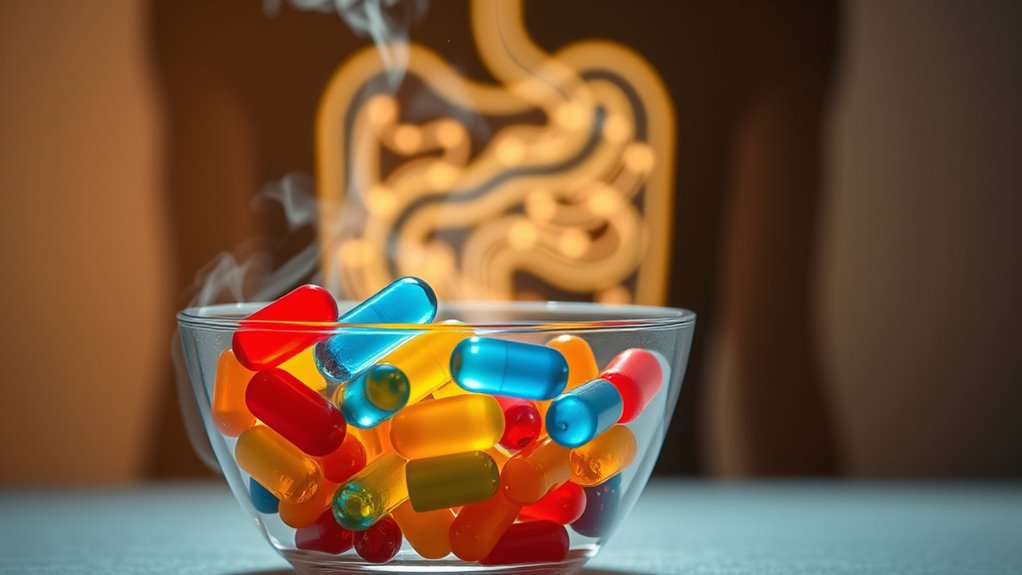Your gut health plays a key role in your mood and mental clarity through the gut-brain axis, which connects your digestive system with your brain. The gut produces major mood-regulating neurotransmitters like serotonin, dopamine, and GABA, with most serotonin made in your gut. When your microbiota is balanced, it supports neurotransmitter production and better communication with your brain. Incorporating probiotics can restore this balance, boosting your mood and mental resilience—so keep exploring to learn how to optimize your gut for better well-being.
Key Takeaways
- The gut-brain axis links digestive health with mood regulation through a complex communication network.
- Gut bacteria produce mood-related neurotransmitters like serotonin, dopamine, and GABA.
- An imbalanced microbiome can impair neurotransmitter synthesis, leading to anxiety and depression.
- Probiotics help restore healthy microbiota, enhancing neurotransmitter production and emotional stability.
- Supporting gut health through probiotics and diet is a proactive step for improving mood and mental clarity.

Many people overlook how closely your brain and gut are connected, yet emerging science shows this relationship profoundly impacts your overall health. This connection, known as the gut-brain axis, is a complex communication network linking your gastrointestinal system and your central nervous system. It’s not just about digestion anymore; it’s about how your gut influences your mood, mental clarity, and emotional resilience. At the core of this connection is neurotransmitter production. Your gut isn’t just involved in breaking down food—it produces a significant portion of the neurotransmitters that regulate your mood, such as serotonin, dopamine, and GABA. When your gut health is compromised, the production of these chemicals can be disrupted, leading to feelings of anxiety, depression, or mental fog.
You might be surprised to learn that around 90% of your body’s serotonin is made in the gut. This neurotransmitter plays a vital role in regulating happiness, sleep, and appetite. If your gut microbiota—the trillions of bacteria residing in your digestive tract—is out of balance, it can impair serotonin synthesis. This imbalance can create a vicious cycle, where poor gut health leads to low serotonin levels, affecting your mood and motivation. Conversely, a healthy gut microbiome supports ideal neurotransmitter production, which in turn promotes better mental health.
Probiotics can be a powerful tool in strengthening this gut-brain axis. By introducing beneficial bacteria into your digestive system, probiotics help restore the balance of your gut microbiota. This balance is essential because a diverse and healthy microbiome produces the right signals to your brain via the gut-brain axis. When your microbiota is thriving, it can enhance neurotransmitter production and improve communication between your gut and brain. This improved signaling can reduce symptoms of anxiety and depression, boost your mood, and even sharpen your cognitive functions.
Research also indicates that the use of robotics in healthcare is expanding, which could further support personalized treatments for mental health and gut-related issues in the future. The science behind this is still evolving, but the evidence is compelling enough to suggest that taking care of your gut isn’t just about digestion. It’s about nurturing your mental health as well. Incorporating probiotic-rich foods like yogurt, kefir, sauerkraut, or taking supplements can support your gut microbiome’s health. Remember, a balanced microbiota helps your body produce the neurotransmitters necessary for emotional stability and mental clarity. By understanding and supporting the gut-brain axis, you’re taking a proactive step toward a healthier mind and body, recognizing that your gut health directly influences how you feel and think every day.
Frequently Asked Questions
Can Probiotics Replace Medications for Mental Health Conditions?
Probiotics can’t replace medications for mental health conditions, but they can serve as helpful supplements or medication alternatives in some cases. While probiotics support gut health and may improve mood, they have limitations and aren’t a substitute for professional treatment. You should always consult your healthcare provider before relying solely on probiotics, especially for serious mental health issues, to ensure thorough care tailored to your needs.
How Quickly Can Probiotics Influence Mood and Mental Clarity?
You might notice mood improvements within a few days, but for most, the timing effects vary from one person to another. Some report feeling more mentally clear in just a week, while others see gradual changes over several weeks. Probiotics influence mental clarity by supporting gut health, which is closely linked to mood. Consistency is key, and patience helps you experience the full benefits of improved gut-brain communication.
Are All Probiotic Strains Equally Effective for Mental Health?
Not all probiotic strains are equally effective for mental health because of strain specificity and clinical efficacy. You should choose strains supported by scientific studies demonstrating their benefits for mood and mental clarity. Some strains target the gut-brain axis more effectively, making them more suitable for emotional well-being. Always check for clinical evidence supporting a specific strain’s mental health benefits to guarantee you get the most effective probiotic.
What Lifestyle Factors Most Affect the Mind-Gut Connection?
You can profoundly impact your mind-gut connection by managing stress and improving sleep quality. Chronic stress disrupts your gut bacteria balance, affecting mood and digestion. Prioritize stress management techniques like meditation or exercise, and establish a consistent sleep schedule to support gut health. When you reduce stress and get quality sleep, you help foster a healthier gut environment, which positively influences your mental well-being and overall mood.
Can Diet Alone Improve Gut Health and Mood Without Supplements?
Yes, diet alone can improve your gut health and mood. Focus on incorporating dietary fibers like fruits, vegetables, and whole grains, which nourish beneficial gut bacteria. Add fermented foods such as yogurt, kefir, sauerkraut, and kimchi to introduce probiotics naturally. These foods support a healthy gut microbiome, which positively impacts your mood. Consistently eating a diverse, fiber-rich diet can markedly enhance your mental well-being without needing supplements.
Conclusion
By now, you see how your gut and mind are closely linked, like two dancers moving in perfect harmony. When you nourish your gut with probiotics, you’re giving your brain the support it needs to stay balanced and happy. Think of your gut as the roots of a tree—healthy roots lead to strong, vibrant branches. So, take care of your gut, and you’ll help your mood flourish like a garden in full bloom.









